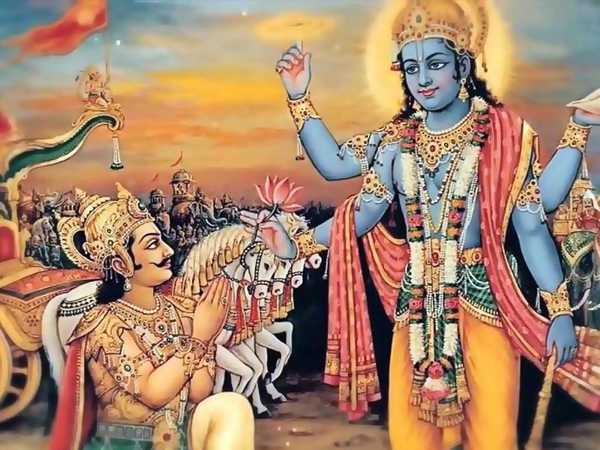Chapter 6

Dhritarashtra said, “Seeing Drona’s son stop at the gate of theencampment, what, O Sanjaya, did those two mighty car-warriors, Kripa andKritavarma, do? Tell me this!”
Sanjaya said, “Inviting Kritavarma, as also the mighty car-warrior Kripa,Drona’s son, filled with rage, approached the gate of the camp. He therebeheld a being of gigantic frame, capable of making the very hair standon end, and possessed of the effulgence of the Sun or the Moon, guardingthe entrance. Round his loins was a tiger-skin dripping with blood, andhe had a black deer for his upper garment. He had for his sacred thread alarge snake. His arms were long and massive and held many kinds ofuplifted weapons. He had for his angadas a large snake wound round hisupper arm. His mouth seemed to blaze with flames of fire. His teeth madehis face terrible to behold. His mouth was open and dreadful. His facewas adorned with thousands of beautiful eyes. His body was incapable ofbeing described, as also his attire. The very mountains, upon beholdinghim, would split into a 1,000 fragments. Blazing flames of fire seemed toissue from his mouth and nose and ears and all those thousands of eyes.From those blazing flames hundreds and thousands of Hrishikeshas issued,armed with conchs and discs and maces.
Beholding that extraordinary being capable of inspiring the whole worldwith terror, Drona’s son, without feeling any agitation, covered him withshowers of celestial weapons. That being, however, devoured all thoseshafts shot by Drona’s son. Like the vadava fire devouring the waters ofthe ocean, that being devoured the shafts sped by the son of Drona.Beholding his arrowy showers prove fruitless, Ashvatthama hurled at him along dart blazing like a flame of fire. That dart of blazing point,striking against that being, broke into pieces like a huge meteor at theend of the yuga breaking and falling down from the firmament afterstriking against the Sun. Ashvatthama then, without losing a moment, drewfrom its sheath an excellent scimitar of the colour of the sky and enduedwith a golden hilt. The scimitar came out like a blazing snake from itshole. The intelligent son of Drona then hurled that excellent scimitar atthat being. The weapon, approaching that being, disappeared within hisbody like a mongoose disappearing in its hole. Filled with rage, the sonof Drona then hurled a blazing mace of the proportions of a pole set upin honour of Indra. The being devoured that mace also.
At last, when all his weapons were exhausted Ashvatthama, casting hiseyes around, beheld the whole firmament densely crowded with images ofJanardana. Drona’s son, divested of weapons, beholding that wonderfulsight, recollected the words of Kripa, and turning pale with grief, said,”He that listens not to the beneficial words of advising friends isobliged to repent, being overwhelmed with calamity, even as my foolishself for having disregarded my two well-wishers. That fool who,disregarding the way pointed out by the scriptures, seeketh to slay hisenemies, falleth off from the path of righteousness and is lost in thetrackless wilderness of sin. One should not cast weapons upon kine,brahmanas, kings, women, friends, one’s own mother, one’s own preceptor,a weak man, an idiot, a blind man, a sleeping man, a terrified man, onejust arisen from sleep, an intoxicated person, a lunatic and one that isheedless. The preceptors of old always inculcated this truth upon men. Ihave, however, by disregarding the eternal way pointed out by thescriptures, and by essaying to tread in a wrong path, fallen intoterrible distress. The wise have called that to be a terrible calamitywhen one falls back, through fear, from a great feat after having essayedto achieve it. I am unable, by putting forth only my skill and might, toachieve that which I have vowed.
Human exertion is never regarded more efficacious than destiny. If anyhuman action that is commenced does not succeed through destiny, theactor becomes like one who falling off from the path of righteousness, islost in the wilderness of sin. The sages speak of defeat as foolishnesswhen one having commenced an act swerves from it through fear. Inconsequence of the wickedness of my essay, this great calamity has comeupon me, otherwise Drona’s son would never had been forced to hold backfrom battle. This being, again whom I see before me, is most wonderful!He stands there like the uplifted rod of divine chastisement. Reflectingeven deeply, I cannot recognise who this being is. Without doubt, thatbeing is the terrible fruit of this sinful determination of mine that Ihad essayed to achieve unrighteously. He standeth there for baffling thatdetermination. It seems, therefore, that in my case this falling off fromfight had been ordained by destiny. It is not for me to exert for theaccomplishment of this my purpose unless destiny becomes favourable. Ishall, therefore, at this hour, seek the protection of the puissantMahadeva! He will dispel this dreadful rod of divine chastisementuplifted before me. I will take the shelter of that god, that source ofeverything beneficial, the lord of Uma, otherwise called Kapardin, deckedwith a garland of human skulls, that plucker of Bhaga’s eyes called alsoRudra and Hara. In ascetic austerities and prowess, he far surpasses allthe gods. I shall, therefore, seek the protection of Girisha armed withthe trident.”




